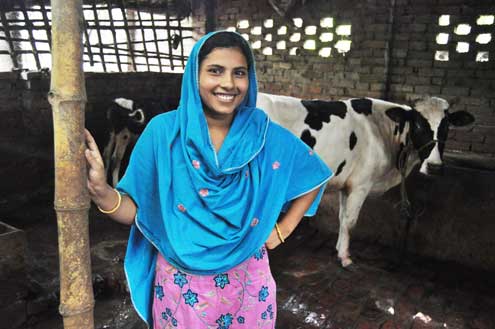The exception to this is the literature that looks at cross-generational effects of girls’s education on well being-related behaviours. The literature from South Asia addressing the position of intergenerational relationships in women’s well being focuses primarily on the dangerous affect of moms-in-regulation on the health and nicely-being of younger married women. Das Gupta argues that moms-in-regulation in India contribute to the ill well being of younger married women by withholding nourishment and medical care. According to Naripokkho, attempts to promote the development of women aren’t likely to be achieved without programmes to advertise the awareness of men regarding inequality, gender discrimination and violence in opposition to women (Naripokkho Oct. 1992, 26). Because customary practices “have ingrained in women the notion that they are not equal to men,” such programmes should also make women extra aware of their authorized rights and standing in society (Huda 12 Aug. 1993).
four Trafficking in Women
And according to a examine carried out by the International Organization for Migration, that surveyed 160 migrant householdsin Dhaka, 66 % mentioned that they have been forced to migrate because of changing climate conditions and environmental hazards, Rabbani says. Contrary to widespread notions of stark Muslim-majority international locations, women in Bangladesh generally costume colorfully. Sri Lanka has shown a high gender pay hole, while Nepal is displaying a comparatively reasonable gender pay hole in comparison with other South Asian countries. However, the share is larger than the world common in all South Asian countries, excluding Bangladesh. In phrases of both hourly and monthly wages, probably the most noticeable gender pay gap exists in Pakistan.

Gender justice in Thailand: working in the direction of the inclusion of all
Farah Kabir, country director for Action Aid Bangladesh, advised the Dhaka Tribune that if men and women equally shared family work, women would be able to earn extra as a result of they might have the ability to work more hours or put in additional effort at paying jobs. Regardless of women’s participation within the skilled workplace, societal norms are that the lady might be liable for household work. This cultural expectation, coupled with Bangladesh’s dominant non secular views, makes work-life balance for profession women in Bangladesh even more tough than their counterparts in Western societies.
Bangladesh is the one country amongst 64 chosen economies where women earn more wages per hour than men, in accordance with a United Nations report. “It’s fantastic that they’ve this common trade that has put women to work,” mentioned Charles Kernaghan, director of the Institute for Global Labor and Human Rights, primarily based in Pittsburgh. Recent road protests in Dhaka, the Bangladeshi capital, by garment staff helped nudge the minimal wage to $sixty eight a month, which he mentioned equates to 33 cents an hour.
Women and poverty in Bangladesh

Analysis of knowledge started with descriptive statistics of the research inhabitants such as frequencies and proportion in relation to several chosen socioeconomic and demographic variables. Multiple binomial logistic regression analysis was executed to seek out out affiliation of every predictor variable with end result variable. Crude odds ratios and adjusted odds ratios with corresponding ninety bangladesh girls five% confidence intervals (CIs) have been estimated. #NoExceptions We support grassroots women’s teams who work every single day to win rights for each girl, girl, and gender non-conforming particular person—no exceptions. Additionally, the garment manufacturers are very involved about their status.
Empowering women entrepreneurs
The conceptual treatment and measurement of the phenomenon of empowerment stays contentious. A evaluation by Malhotra and Schuler highlights a disjunction between the conceptual and empirical literature on empowerment.
We decided the empowerment status of the extra women in the triads by administering the empowerment module from our 2002 survey, as these women have been residing outside the first research websites and therefore were not included in that survey. The end result was a final sample of 14 empowered moms, six unempowered mothers, 11 empowered moms-in-law and eight unempowered mothers-in-law, double-counting the two interviewed both in mother triads and mom-in-legislation triads (Table 1). Open-ended, in-depth interviews have been conducted with triads of women (interviewed individually) — young married women, their mothers, and their mothers-in-regulation — with husbands and fathers-in-law interviewed to get additional perspectives1. Our preliminary universe for selecting the triads was all women with at least one son or daughter who married throughout the past 5 years but more than one yr ago, in order that recent choices about marriage and childbearing initiation would have taken place.
Besides guaranteeing women the same voting rights as men, the structure of Bangladesh, which was adopted in 1972, also expressly dictates provisions in favour of girls that are apt to be viewed as historic within the context of ladies empowerment in the Bangladesh of the 70’s. Amongst such rules are those offering for equal opportunities for ladies in “all spheres of nationwide life” and reserving seats completely for ladies members in the parliament. In a world which was, and remains, male-dominated, for a new nation like Bangladesh to ensure such rights for girls so early on was a mirrored image of hope for the way forward for women rights and empowerment.
There is also a temporary shelter run by the Ministry of Women’s Affairs for girls requiring rehabilitation into society, but the shelter is used primarily by former prostitutes and is not out there to victims of domestic violence. The capability of each shelter is estimated at between 10 and 20 women (Huda 12 Aug. 1993).
There’s an enormous difference between earning your personal dwelling and relying on your husband’s earnings in your living.” She additionally inspired her daughter-in-regulation to manage the household accounts. In her interview she mentioned she told her son “You should give your earnings to your wife. You ought to only keep pocket cash in your hand and you need to give the rest of the money to your wife.” Her daughter-in-legislation now manages the household funds.
